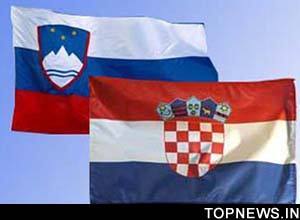Albania, Croatia eager for their entry into NATO
 Belgrade - Few NATO member states show their enthusiasm for the alliance as strongly and openly as Albania and Croatia are doing in the days leading up to their assumption of membership in the military alliance.
Belgrade - Few NATO member states show their enthusiasm for the alliance as strongly and openly as Albania and Croatia are doing in the days leading up to their assumption of membership in the military alliance.
Across the entire political and media spectrum in both countries, the move is being described as a dream come true.
As both nations have occasional problems with some of their neighbours, Albania and Croatia are looking forward to their upgraded diplomatic clout, which comes automatically with a membership card to the world's most powerful military club.
In addition, Albania and Croatia hope the NATO label will accelerate their efforts to gain membership of the European Union and also lead to lower defense costs.
Albania, which denounced the Soviet model of Communism during the Cold War and instead embraced China, made a rapid about-turn in recent years to become a staunch supporter of the West.
As soon as the communist regime fell, Albania opened its Adriatic ports and began exercises with the United States and allies. A US flag was demonstratively placed behind the desk of the prime minister.
When former US President George W Bush headed to the impoverished country in June 2007, it was for more than just a visit. He arrived to thank the country for its backing and the restraint it showed during a slew of recent wars involving ethnic Albanians in countries on its border.
Tirana did not overtly support Albanian extremists fighting Belgrade's security forces in the neighbouring Kosovo during NATO's intervention against Yugoslavia in 1999. However, it did take in and cared for hundreds of thousands of refugees.
Two years later, during brief fighting that came dangerously close to an all-out civil war of minority Albanians and majority Slavs in Macedonia, Tirana once again earned top diplomatic marks from Brussels and Washington by staying uninvolved.
Of course, the visit wasn't perfect: Bush's wristwatch got lifted while he was working the crowd. The incident highlighted Albania's widespread poverty, one of its most severe problems.
NATO membership is as eagerly awaited in Croatia, where surveys show that nearly two-thirds of the voters back their country's accession to the alliance.
The opposition, mostly within student and intellectual circles, has never managed to summon more than a few hundred people to attempted anti-NATO demonstrations.
"The cost of individual defence would be three times greater than what it will be with NATO allies," President Stjepan Mesic said years ago.
"Accession to NATO will power our quicker drive to the EU," according to Prime Minister Ivo Sanader.
But more than anything else, NATO would help Croatia heal the trauma left by the attack of Belgrade's army as Yugoslavia disintegrated in 1991 and the subsequent Serb insurgency, which was only crushed in 1995.
Membership of NATO is a guarantee against any attack by neighbours, according to a chorus of politicians and analysts.
Croatia was also far from pleased with the success of its northern neighbour, the tiny Slovenia, which made it into both NATO and EU more than half a decade ago.
During that time, Slovenia, which is seen a respected member of the Europe's upper diplomatic tier, had more than once made clear that it considered Croatia to be a second-league player.
Most recently, amid a border dispute with Zagreb, Ljubljana played games with Zagreb's invitation to join NATO, raising a question as to whether Croatia would even be extended at the summit in Strasbourg.
Ljubljana only signed off on the invitation on March 27. Had it delayed the decision by much longer, a delay in the accession of both Croatia and Albania could have been necessary.
Croatia will now at least be able to turn east and play the same games with its favourite foe, Serbia. On his visit to Belgrade in March, Sanader already "acted like a strutting duck," Serbian newspapers commented. (dpa)